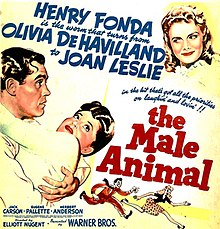The Male Animal
| The Male Animal | |
|---|---|
 Theatrical release poster | |
| Directed by | Elliott Nugent |
| Screenplay by |
|
| Based on | The Male Animal (play) by James Thurber and Elliott Nugent |
| Produced by |
|
| Starring | |
| Cinematography | Arthur Edeson |
| Edited by | Thomas Richards |
| Music by | H. Roemheld |
| Distributed by | Warner Bros. |
Release date |
|
Running time | 101 minutes |
| Country | United States |
| Language | English |
| Box office | $1 million (US rentals)[1] |
The Male Animal is a 1942 American comedy-drama film produced by Warner Bros., starring Henry Fonda, Olivia de Havilland and Joan Leslie.[2][3]
The film was based on a hit 1940 Broadway play of the same name written by James Thurber and Elliott Nugent. The screenplay was written by , Julius J. Epstein, and Philip G. Epstein, based on Nugent and Thurber's play. The film was also directed by Elliott Nugent.
Plot[]
Tommy Turner (Henry Fonda) is an English teacher at football-crazed Midwestern University. Although he is uninvolved with the politics of the day, Tommy suddenly finds himself the center of a free-speech debate on campus. An editorial in a student magazine praises him for planning to read Bartolomeo Vanzetti's sentencing statement to his class as an example of eloquent composition, even in broken English composed by a non-professional.
The school's conservative trustees, led by Ed Keller (Eugene Pallette) threaten to fire Tommy if he doesn't withdraw the reading from his lecture. The subject of free speech and Tommy's dilemma of conscience anchor the dramatic subplot's social significance. The lighter comic triangle plot concerns a return visit to attend the big football game by Joe Ferguson (Jack Carson), a former football hero and onetime love interest of Turner's wife Ellen (Olivia de Havilland). Joe is recently divorced and he rekindles Ellen's romantic notions at the very moment when her marriage to Tommy is being tested by the events on campus.
Cast[]
- Henry Fonda as Tommy Turner
- Olivia de Havilland as Ellen Turner
- Joan Leslie as Patricia Stanley
- Jack Carson as Joe Ferguson
- Eugene Pallette as Ed Keller
- Herbert Anderson as Michael Barnes
- Hattie McDaniel as Cleota
- Ivan Simpson as Dean Frederick Damon
- Don DeFore as Wally Myers
- Jean Ames as "Hot Garters" Gardner
- Minna Phillips as Mrs. Blanche Damon
- Regina Wallace as Mrs. Myrtle Keller
- Frank Mayo as Coach Sprague
- William B. Davidson as Alumnus
- Bobby Barnes as Nutsy Miller
Production[]
Gene Tierney, who had starred as Patricia Stanley in the original Broadway production, was unable to appear in the film because she was contracted to star in John Ford's movie version of Tobacco Road. Don DeFore, another member of the Broadway cast, repeated his role in the film. Co-writer Elliott Nugent played the lead role on the stage before coming to Hollywood to direct Henry Fonda in the film version. Gig Young, who changed his birth name / stage name, Byron Barr, that year, appears unbilled as a student.
Olivia de Havilland appeared in this film while simultaneously making They Died with Their Boots On (1941) starring Errol Flynn, putting the actress under enormous pressure from overwork.[4]
Remake[]
The Male Animal was loosely reworked by Warner Brothers as a musical called She's Working Her Way Through College (1952), starring Virginia Mayo and Ronald Reagan. In this adaptation, the characters' names are changed. Also, the political theme is discarded in favor of a conflict surrounding the professor's attempt to mount a musical play featuring a student who is discovered to be a former burlesque dancer.
The remake earned an estimated $2.4 million at the North American box office in 1952.[5]
The remake features Gene Nelson and Phyllis Thaxter in the cast, as well as Don DeFore who had also been in The Male Animal.
References[]
- ^ "101 Pix Gross in Millions". Variety. January 6, 1943. p. 58.
- ^ Variety film review; March 4, 1942, page 8.
- ^ Harrison's Reports film review; March 7, 1942, page 38.
- ^ Higham, Charles (1984). Sisters: The Story of Olivia de Havilland and Joan Fontaine. Dell Publishing. p. 136. ISBN 0-440-17866-5.
- ^ "Top Box-Office Hits of 1952". Variety. January 7, 1953.
External links[]
- The Male Animal at IMDb
- The Male Animal at AllMovie
- The Male Animal at the TCM Movie Database
- The Male Animal at the American Film Institute Catalog
- The Male Animal at the Internet Broadway Database
- Song, "We Don't Give a Damn for the Whole State of Michigan"
- 1953 Best Plays radio adaptation of original play at Internet Archive
- 1942 films
- English-language films
- 1942 romantic comedy films
- American black-and-white films
- American films
- American romantic comedy films
- American satirical films
- Films about educators
- American films based on plays
- Films based on works by James Thurber
- Films directed by Elliott Nugent
- Films set in universities and colleges
- Warner Bros. films
- Films scored by Heinz Roemheld